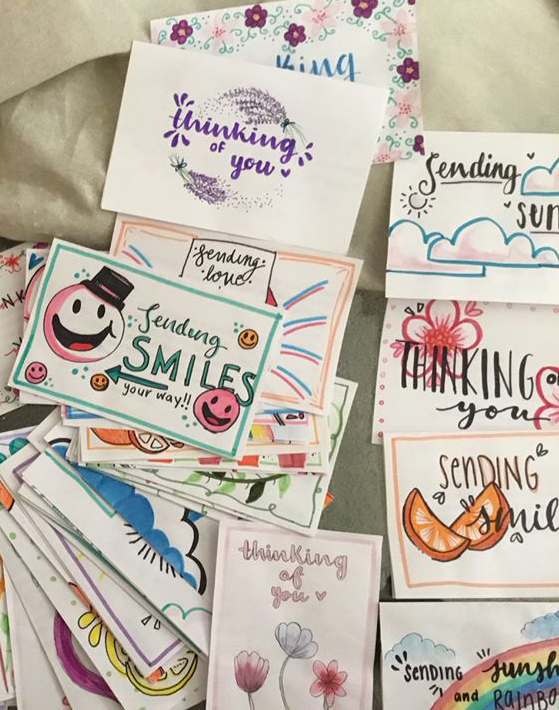Lending Our Hands Six Feet Apart
These homemade cards were created as part of St. John Neumann Catholic High School project in Naples in April 2020. Similar cards have been created to be delivered to nursing homes in the Bradenton area by parishioners of Ss. Peter and Paul the Apostles Parish.
No Visitors Allowed.
Due to the COVID-19 pandemic, many individuals are confronted with this unfortunate message when trying to spend time with a nursing home’s seniors. This situation has generated prominent anguish both inside and outside of nursing homes. Many are worried that nursing home residents are not receiving the adequate love and care that they need, especially in these desolate times. Nurses working in those homes usually rely on volunteers to provide entertainment or comfort for the residents, but with visitor restrictions in place, many nurses feel overworked having to supervise a nursing home resident more than usual.
But these restrictions were not implemented unjustified. According to the New York Times, “at least 163,000 coronavirus deaths have been reported among residents and employees of nursing homes and other long-term care facilities for older adults in the United States,” which is “more than one-third of U.S. coronavirus deaths.” Also, “as of Feb. 12, the virus has infected more than 1,279,000 people at some 31,000 facilities.” Considering these tragic statistics, many understand that they cannot enter a center without placing residents’ lives at risk.
Nevertheless, this forced isolation forges anxiety among many nursing home communities. Sky Gonzalez, son of Eva Gonzalez, a 98-year-old resident of a Southern California nursing home, admits that he believes that his mother “feels that we’ve abandoned her.” Gonzalez’s worries are reasonable, considering that the only interaction that he can have with his mother is “on the phone.”
Shaker High senior, Sienna Dunham, “find[s] it extremely unfortunate that the nursing homes are closed.” She understands that she cannot put the elders’ safety at risk, but she still feels guilty. Dunham notes that “even without volunteers, many have been put into their rooms and have lost group interactions with the people just across the halls for them, and it must be extremely difficult to cope with, especially with the ones with dementia or other mental issues that don’t allow them to fully comprehend what is going on.” In summary, disorder is arising, unfortunately, both inside and outside of centers.
Shaker High senior, Ashley Cheffolway, shares Dunham’s discontent. For one, “those in nursing homes are already known for being lonely and lacking visitors in a normal year, but now with COVID they are completely isolated.” Cheffolway “also heard about the virus spreading within the homes and causing tragic deaths, obviously since older people are high risk.” The danger that nursing home seniors constantly have to face stirs anguish among many.
Mark Morgan, a high school senior in Pittsburgh, Pennsylvania, maintains that “there’s no such thing as a perfect solution.” He stresses that keeping residents isolated from their loved ones has “[caused] serious effects on residents’ mental and emotional wellbeing.” Furthermore, he asserts that “it’s not really fair to ban visitors in the name of protecting against COVID and then allow residents who are actually sick with COVID to stay at nursing homes infecting countless others.” Clearly, a nursing home’s questionable actions are not overlooked.
The residents themselves also feel at loss due to a decline in human interaction. Robyn Grant, public policy director for the National Consumer Voice for Quality Long-Term Care, laments that “residents are declining mentally, physically.” With fewer visits from their loved ones, residents feel wretched without loving smiles and warm hugs from their families.
But even though people are currently unable to physically enter nursing homes, some have found ways to help residents in other creative ways. For example, the Shaker High School Key Club officers bought ornament kits at a craft store and had their finished products delivered to Eddy, a nursing home in Latham. Also, Shaker’s Tri-M Music Honor Society ran a project involving its members playing Christmas music for a video that was sent to Shaker Place, a nursing home in Albany.
Morgan also has been trying to stay in touch with nursing homes, “try[ing] to call/check up on people who [he] knows like family members who are in nursing homes a few times since the pandemic started.”
Dunham, one of the Key Club co-presidents, has “been pushing for Key Club to interact more with nursing homes.” In fact, she was the one who “contacted the Eddy and delivered [the] handmade ornaments to the main office to put up for Christmas.” Cheffolway, as Key Club’s vice president, “participated in this as well.” Dunham is already making plans for staying in touch with nursing home elders in the future, “looking into the possibility of playing Bingo virtually with the Eddy.”
In Springboro, Ohio, according to WDTN news students were given an opportunity to “writ[e] letters to residents of several nursing homes in the area” back in April 2020. Wanting to ensure that nursing home residents are receiving the love that they need, these students assembled messages that affirmed to residents that people outside of their center still care about them.
One resident, Dees Thompson, was actually so moved by the students’ efforts that she could not help but dearly respond to them. “We all love mail and during this ‘lock down’ period, mail is even more important,” she highlights in her letter.
As exemplified by others, there are many ways that one can aid nursing home residents during the pandemic. It is crucial to reinforce to the elders that they have not diminished in people’s memories, even if that sentiment cannot be expressed physically.
Daily Caring reminds individuals to “talk on the telephone,” for “sometimes we forget that a good old-fashioned phone call is a wonderful way to stay connected.” Especially since most nursing home elders are comfortable with using the telephone, having one’s warm voice soothe into their ears is effective for lifting their low spirits.
Furthermore, Daily Caring addresses that “there’s extra comfort and reassurance in seeing someone’s face,” which is why video calls are also good for staying connected with nursing home residents. Also, “[one would] be able to better assess their level of health and well-being,” which is a concern that many individuals have since they cannot physically monitor an elder’s status as much as they used to before the pandemic. The most popular video calling services include Zoom, Skype, and Google Meet.
For nursing home residents who are unfamiliar with technology, one can still “ask their care community if [he] can drop off letters or care packages for them.” Daily Caring suggests that people “put together a bag of basic supplies, favorite snacks, or comfort items and drop it off for them.” However, people should remember to thoroughly clean their care packages to minimize the risk of exposing a nursing home resident to COVID-19.
Finally, Daily Caring outlines that one can “encourage family and friends to send letters and cards.” No one can deny that the quality that is exerted in the meticulous hours spent on a card flows into his messages, loading a recipient with joy. Hence, “everyone loves to get mail, especially when we’re feeling disconnected and isolated.”
Cheffolway is considering doing a “pen-pal type of thing or online video chatting” for residents. No matter what she does, she knows that she “will have to do something for the elderly soon because [she’s] sure they are struggling.” With our world’s current circumstances, nursing home elders need all the support they can from their community.
Dunham enforces that “we can always do more than what we’re currently doing with just a little bit of imagination.” She understands that “times are difficult for everyone,” but that should not stop one from making a nursing home elder feel loved. Dunham accentuates that one can do so much “with a little applied effort,” with actions as minimal as “spreading awareness over the difficulties the elderly people are facing right now to get more volunteers involved.”
Morgan acknowledges that “we should push for government action that’ll make nursing homes safer, like not forcing nursing homes to accept and treat people who have COVID.” However, he agrees with Dunham that “it’s the little things that can really make life a bit better for people in nursing homes right now, like calling those who you know or making cards.”
As a formerly avid music performer at local senior living centers with my friends, during the pandemic, I was concerned that nursing home residents would not receive enough love to emotionally survive in these distressing times. However, I later found ways to ensure that residents’ hearts do not shrivel in visitors’ absences. I created multiple music performance videos, cards, ornaments, and crafts to alleviate the stress that I feel for the lonely elders in my community. We cannot be spectators when our communities are struggling.
Helping others fuels us with purpose.
It is important to find some way to remain connected with struggling residents in this pandemic. Visitors are typically residents’ only sources of comfort outside of their centers. Without these visitors, many elders feel trapped in dread, worry, and isolation.
Just because we cannot physically interact with nursing home residents does not mean that we cannot interact with them at all. While staying in our bedrooms for an extended time can decrease our productivity, we still need to share our time with others.
Residents must feel at home.
But today, most feel imprisoned.


